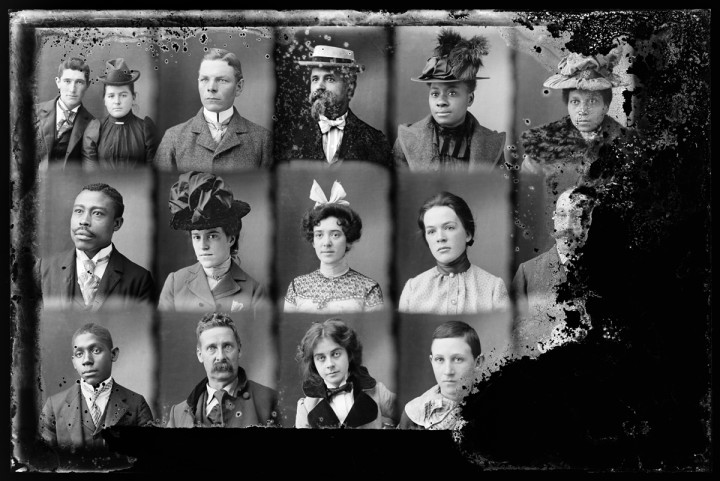A century ago, there were no phone cameras or selfie sticks. Instead, you would’ve put on your most elegant dress or best suit, gone down to a local department store or traveled to a nearby city to have your portrait taken. If you were allowed to, that is. For many nonwhite Americans living in a post-Reconstruction South ravaged by discrimination and segregation, getting a portrait in the public sphere was out of the question.
If you lived in North Carolina during that period, however, you had another option: The studio of Hugh Mangum (1877-1922) — an itinerant photographer with a Penny Picture Camera — offered an unbiased eye and made house calls.
From the early 1890s until his death in 1922, Mangum, who was born and based in Durham, traveled all over North Carolina, Virginia and West Virginia, photographing anybody and everybody who lined up. From town to town he set up a temporary studio — a proto-pop-up photo booth of sorts — for up to three months. Families and individuals, young and old, black and white, rich and poor were among the thousands who sat for their portraits. Hundreds of those faces make up Keep All You Wish: The Photographs of Hugh Mangum, on view at the Asheville Art Museum.
The exhibition takes its name from a letter that Mangum wrote to his sister in 1922, in which he ominously told her to “give my love to all and keep all you wish.” He died just a few weeks later, but the sentiment lived on in his work, embodied in each of his portraits.
The images on display were reproduced from the original plates by Sarah Stacke, a Brooklyn-based photographer and the exhibition’s curator. The show also includes a small collection of Mangum’s hand-printed photographs and bits of ephemera, like test strips, buttons and studio advertisements, from the personal collection of Mangum’s granddaughter Martha Sumler. The bulk of the photos were reproduced from the originals at Duke University’s David M. Rubenstein Rare Book and Manuscript Library, where Mangum’s work is archived.
“No matter how society perceived a person, they were always welcomed into Mangum’s studio,” says Stacke. Four children pose behind their seated parents in one family portrait while another shot shows more than 20 members spanning four generations crowded around a lunch table. These pictures and the dozens of individual portraits feature a mix of every possible race, creed and character. “The work celebrates identity,” Stacke says. “It really provides an insightful, perceptive glimpse into that period.”
It’s that openness and warmth that Stacke says allowed Mangum’s sitters to relax and fully become themselves in front of his camera. His images reveal smiling, pleasant and even playful individuals. One image shows two women poking their heads through newspapers, as if they were they were flowers. Another shows one girl trying on different hats and hairstyles.
While some of the images are singular, featuring one portrait per print, many of the show’s works offer up multiple portraits per frame. The Penny Picture Camera he carried used glass plates that allowed for multiple exposures — two to 24 depending on the type — per plate.

Contemporary reprints by Sarah Stacke.
In a 15-frame self-portrait, Mangum jumps from stoic, contemplative and postured poses to turning his back on the camera and even candidly poking his eyes over the brim of a hat. An adjacent image features a radiant young black woman in the upper left corner, bordered by nine others. She stands out because of the minimal yet startling nature of her simple white dress and her proud forward gaze.
Of the thousands of glass plate negatives that Mangum used, only around 700 have been found and preserved. The photographer used a tobacco packhouse on his family’s farm outside Durham as a darkroom and storage space. Several hundred plates were recovered from that building, where many had been damaged by the elements (and the chickens).
Mangum was one of only a few Southern photographers who broke with social norms and worked openly with nonwhite communities. But according to Stacke, this isn’t the only thing that makes his work so interesting. “The order of the images on the glass plates represents the order that people came into his studio,” she says. “You can really see that he had an open, revolving door, and keeping them together is what makes them unique.”
WHAT: Keep All You Wish: The Photographs of Hugh Mangum
WHERE: Asheville Art Museum, ashevilleart.org
WHEN: Exhibition on view through Sunday, July 12. Curator Sarah Stacke gives a gallery talk on Friday, May 8, at 5:30 p.m.



Before you comment
The comments section is here to provide a platform for civil dialogue on the issues we face together as a local community. Xpress is committed to offering this platform for all voices, but when the tone of the discussion gets nasty or strays off topic, we believe many people choose not to participate. Xpress editors are determined to moderate comments to ensure a constructive interchange is maintained. All comments judged not to be in keeping with the spirit of civil discourse will be removed and repeat violators will be banned. See here for our terms of service. Thank you for being part of this effort to promote respectful discussion.